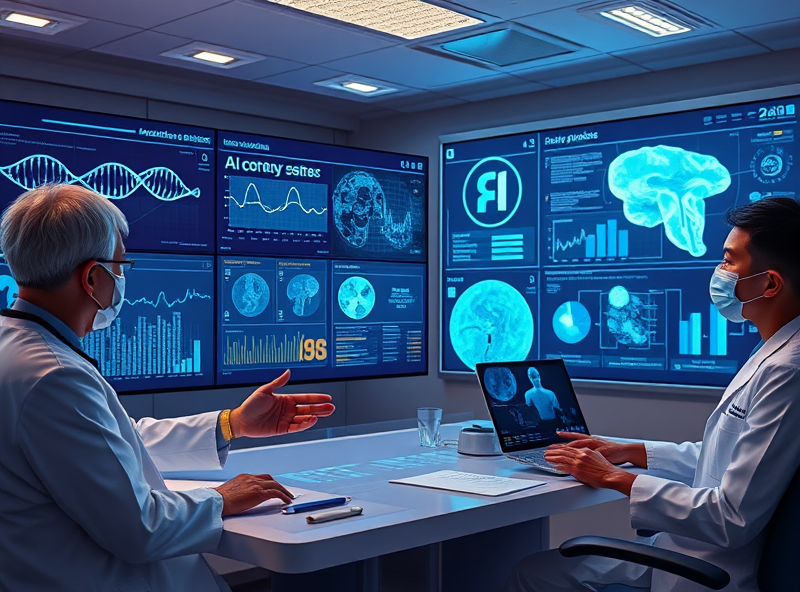
Tempus AI: Transforming Healthcare with Data and AI
Revolutionizing Diagnostics Through Data and AI Integration

Tempus AI is at the forefront of a healthcare revolution, transforming how diagnostics are performed by integrating vast amounts of clinical and molecular data with advanced artificial intelligence. At its core, Tempus uses AI to analyze data from electronic health records, genomic sequencing, pathology reports, and radiology images to deliver faster, more accurate diagnoses and personalized treatment recommendations.
One of the most significant impacts of this integration is in oncology. Tempus’s AI models can identify genetic mutations and biomarkers from a patient’s tumor profile, helping oncologists select the most effective targeted therapies. This not only improves patient outcomes but also reduces the time and cost associated with trial-and-error treatments.
Moreover, Tempus enables real-time data sharing and collaboration among healthcare providers, ensuring that critical insights are accessible when they matter most. This is especially valuable in complex cases where timely, data-driven decisions can be life-saving.
By harnessing the power of AI, Tempus is also helping to reduce diagnostic errors, which are a leading cause of preventable harm in healthcare. Its predictive models can flag potential misdiagnoses or overlooked conditions, prompting further investigation before clinical decisions are made.
As AI continues to evolve, platforms like Tempus are setting a new standard for precision medicine—where diagnostics are not just reactive but predictive and proactive. This marks a fundamental shift in how we approach disease detection and management, offering hope for earlier interventions and better health outcomes.
For more on how AI is shaping the future of healthcare, you can explore this article from the National Institutes of Health: https://www.ncbi.nlm.nih.gov/pmc/articles/PMC8183245/
Revolutionizing Diagnostics Through Data and AI Integration

In a rapidly evolving healthcare landscape, Tempus AI stands out by seamlessly integrating advanced data analytics and artificial intelligence to improve diagnostic accuracy and patient outcomes. What makes Tempus unique is its ability to aggregate and analyze both structured and unstructured clinical data — including electronic health records, pathology reports, and genomic sequencing — to deliver actionable insights in real time.
Unlike traditional diagnostic tools that rely on limited datasets, Tempus leverages a vast, continuously updated database to identify patterns and correlations that may not be visible to the human eye. This empowers physicians to make more informed decisions, personalize treatment plans, and ultimately reduce time to diagnosis. For example, Tempus’s AI models can predict the likelihood of certain cancers responding to specific therapies, which can significantly enhance treatment efficacy.
Another key differentiator is Tempus’s commitment to interoperability. Their platform is designed to integrate smoothly with existing hospital systems, minimizing workflow disruption and ensuring that clinicians can access insights without navigating multiple tools. This user-centric approach makes Tempus not just a technology provider, but a true partner in care delivery.
As AI continues to shape the future of medicine, Tempus AI is leading the charge by making precision medicine more accessible and effective. For those in the healthcare industry, adopting such tools isn’t just about staying competitive — it’s about delivering better care.
Source: https://www.tempus.com/technology/
Strategic Growth: Acquisitions, Partnerships, and Global Reach

Tempus AI is not just revolutionizing healthcare through data and artificial intelligence—it’s also strategically expanding its global footprint to ensure that cutting-edge diagnostics and personalized treatment options are accessible worldwide. One of the key drivers of this growth is Tempus’s thoughtful approach to acquisitions. By acquiring complementary health tech companies, Tempus accelerates its capabilities in genomic sequencing, clinical trial matching, and real-world evidence generation. These acquisitions not only enhance their technological edge but also expand their patient data network, making their AI models more accurate and inclusive.
In addition to acquisitions, Tempus has formed strategic partnerships with leading healthcare institutions, pharmaceutical companies, and research organizations. These collaborations enable Tempus to integrate its AI-driven tools into clinical workflows, supporting physicians with real-time insights that improve patient outcomes. For example, partnerships with cancer centers allow Tempus to provide oncologists with precision medicine solutions tailored to each patient’s unique genetic profile.
Global reach is another pillar of Tempus’s growth strategy. By entering international markets and complying with regional healthcare regulations, Tempus ensures that its innovations are not limited to the U.S. healthcare system. This global expansion allows the company to gather more diverse datasets, which in turn improves the performance and fairness of its AI models.
This multi-pronged approach—acquisitions, partnerships, and international expansion—positions Tempus AI as a leader in the future of precision medicine. Their strategy not only strengthens their business but also brings tangible benefits to patients and healthcare providers around the world.
Source: https://www.forbes.com/sites/brucelee/2023/06/06/tempus-ai-files-for-ipo-heres-what-you-should-know/
Challenges and the Future Vision for AI-Powered Medical OS

As Tempus AI continues to reshape the healthcare landscape, one of its most ambitious goals is to build a fully integrated, AI-powered medical operating system (OS). This vision promises to streamline clinical workflows, personalize treatment plans, and accelerate research. However, achieving this comes with significant challenges.
One of the primary hurdles is data interoperability. Healthcare data is often fragmented across different systems and formats, making it difficult to unify for AI training and real-time clinical use. Without standardized data exchange protocols, even the most advanced AI models can be limited in their effectiveness.
Another challenge is ensuring data privacy and security. Medical data is highly sensitive, and any AI system must comply with strict regulations like HIPAA in the U.S. or GDPR in Europe. Tempus and similar companies must invest heavily in secure data infrastructure and transparent data governance to build trust with patients and providers.
Clinician adoption is also a critical factor. Many healthcare professionals are cautious about integrating AI into their workflows due to concerns about accuracy, liability, and the learning curve. To overcome this, AI tools must be intuitive, evidence-based, and clearly demonstrate clinical value.
Looking ahead, the future of AI-powered medical OS lies in seamless integration with electronic health records (EHRs), real-time decision support, and continuous learning from new data. If successful, this could transform healthcare from reactive to proactive, improving outcomes and reducing costs.
For example, Tempus is already working on platforms that analyze genomic, clinical, and imaging data to guide oncology treatment decisions. As these systems evolve, they could become central hubs for precision medicine across all specialties.
The road ahead is complex, but the potential benefits—faster diagnoses, personalized therapies, and more efficient care—make the journey worthwhile.
Source: https://www.healthit.gov/topic/scientific-initiatives/precision-medicine





